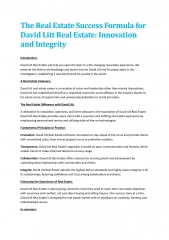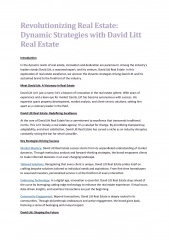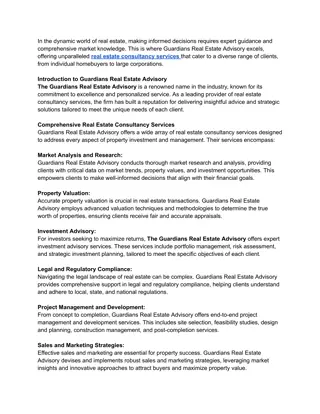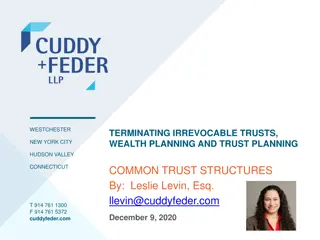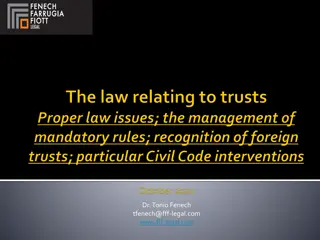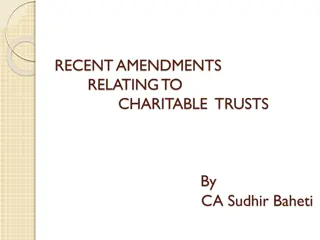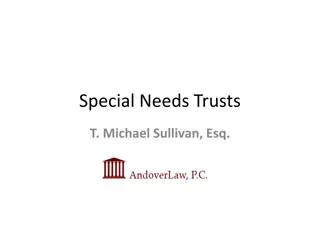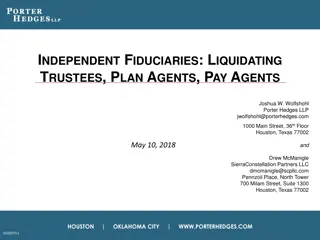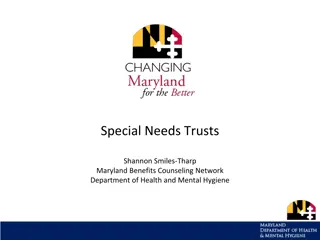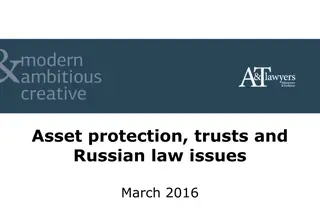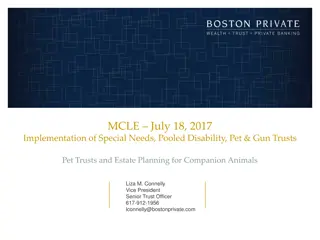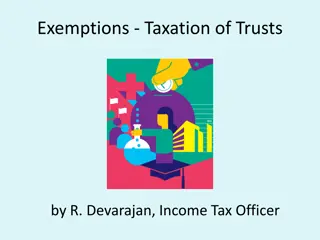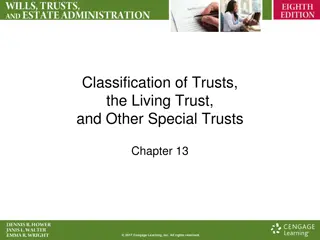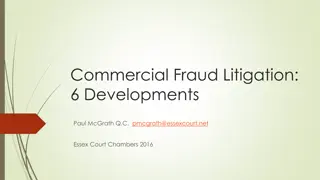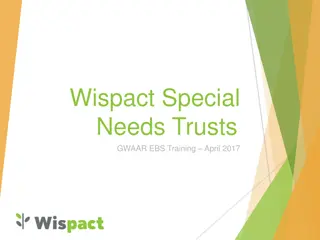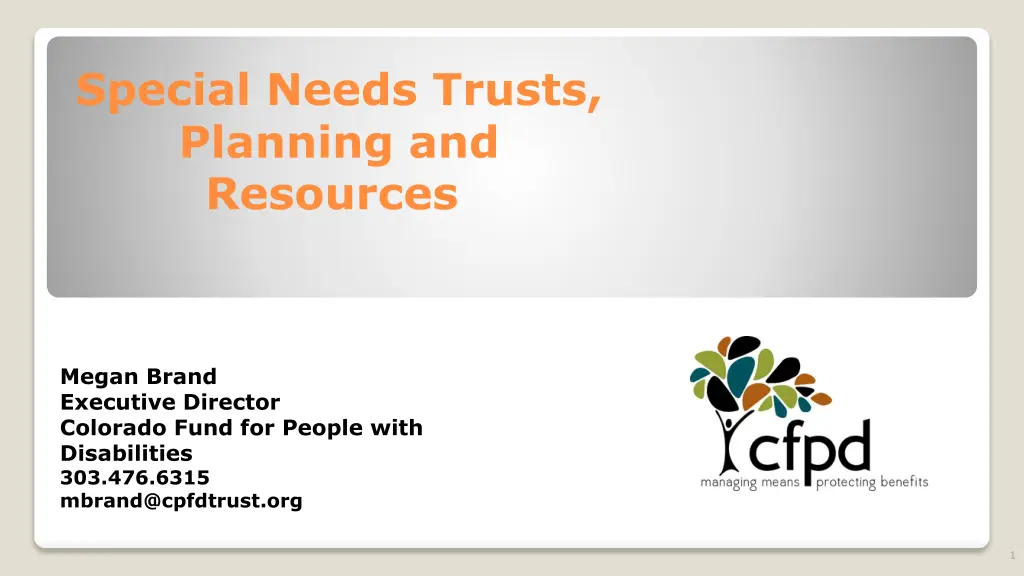
Understanding Special Needs Trusts and Planning for People with Disabilities
Explore the world of Special Needs Trusts, their importance for individuals with disabilities, and resources provided by Megan Brand, Executive Director of Colorado Fund for People with Disabilities. Learn who needs a Special Needs Trust, types of trusts available, and essential information on public benefits for clients.
Download Presentation

Please find below an Image/Link to download the presentation.
The content on the website is provided AS IS for your information and personal use only. It may not be sold, licensed, or shared on other websites without obtaining consent from the author. If you encounter any issues during the download, it is possible that the publisher has removed the file from their server.
You are allowed to download the files provided on this website for personal or commercial use, subject to the condition that they are used lawfully. All files are the property of their respective owners.
The content on the website is provided AS IS for your information and personal use only. It may not be sold, licensed, or shared on other websites without obtaining consent from the author.
E N D
Presentation Transcript
Special Needs Trusts, Planning and Resources Megan Brand Executive Director Colorado Fund for People with Disabilities 303.476.6315 mbrand@cpfdtrust.org 1
Presentersbio: Megan Brand is the Executive Director of CFPD-Colorado Fund for People with Disabilities. Megan began her service at CFPD in 2003 and has been the Executive Director since 2010. Megan has a bachelor s degree in social work from the College of St. Benedict over 20 years of experience in working with people with disabilities, their families, service providers, attorneys, trustees, financial planners, guardians and other professionals. She leads a staff of 27 in administering the largest and longest-standing locally managed pooled trust in Colorado, as well as providing myriad of other services that offer protection, personalized attention, access to our network of organizations and services, and financial and benefit s guidance. In addition to leading the staff, Megan is a former board member of the Colorado Guardianship Association and currently serves on the board for the National Planned Lifetime Assistance Network and Community Living Alternatives and is a frequent presenter in the community, both locally and nationally, on Special Needs Trusts and related topics. 2
Who needs a Special Needs Trust (SNT)? Persons on benefits receiving funds exceeding $2,000 Inheritance, back-payments of Social Security, gifts Settlements Personal Injury Worker s Compensation Note need for Medicare Set-Aside Trust as applicable Medical Malpractice Divorce Liquidation of personal assets Sale of home Excess resources Employment wages Persons unable to personally handle sums of money or may be vulnerable to exploitation Persons who may receive benefits in the future 3
Special Needs Trusts: Disability Trusts and Special Needs Planning Special Needs Trust (SNT) (also called Supplemental Needs Trusts, Disability Trusts, d(4)(a) and d(4)(c) Trusts). Types of Special Needs Trusts: First Party Individual Trusts Subject to Medicaid approval Can be created by Court, parents or guardian of beneficiary and self created Payback provisions on death or termination of trust Income taxable to beneficiary Third Party Individual Trusts Settlor/Creator = third party (inter vivos or testamentary) No payback provisions More flexibility Pooled Special Needs Trusts (1st and 3rd Party) Managed by a non-profit organization Master trust document Can be created by Court, parents or guardian of beneficiary and self created More Portability from state to state 4
Know your clients public benefits!! SSI (Supplemental Security Income)- $771/month (2010) SSDI (Social Security Disability Income) - based on work records SSA (Social Security) Medicaid Medicare Food Stamps Public Housing DeCambre v Brookline Housing Authority (D.Mass, No. 14- 13425-WGY, March 25, 2015) 5
Benefits Comparison SSI SSDI SSA Social Security Supplemental Security Income Disability Social Security Disability Income * Disability Retirement No work history required Work history required Work history required Income Cap - $771/month (201) Resource Cap - $2,000 Income Cap Depends on work record No Resource Cap Income Cap Depends on work record No Resource Cap Always Medicaid Typically Medicare Typically Medicare * A person determined disabled by SSA by the age of 22 is eligible under their parent s benefit when their parent is on SSA or deceased. 6
Medicaid Medicare Medicaid Expansion Health Care Health Care Health Insurance Federal Administration Individual State Administration Individual State Administration and Opt- In Financial Qualification for Income only Does NOT cover in-home care or long-term care Financial & Disability Qualification Covers in-home care programs, skilled nursing care, long term care, prescriptions Estate Recovery: YES Age OR Disability Qualification Covers hospitalization, 100 days max rehabilitation, prescriptions Estate Recovery: NO Estate Recover: Yes in CO Varies state to state. 7
What Can an SNT Pay For? Recreation: vacation, companionship services, entertainment, pets, cable TV, subscriptions Medical Care (not covered by benefits): dental, glasses, hearing aids, massage, co-pays, vitamins/supplements, hair care, personal supplies Household: home purchase, maintenance, clothing, telephone, appliances, furniture, insurance, accessibility upgrades Transportation: public services, vehicle, auto insurance, gas, vehicle maintenance Education: public/private, training, computer/software, books, vocational training Services: attorney/accountant fees, alternative therapies, conservator/guardian fees, burial plan Lewis v. Alexander, 685 F.3d 325 (3rd Cir. 2012) 8
Tax Grantor Trust (1st Party trusts only) Internal Revenue Code 674 & 677 Can be appropriate for self-administered SNTs Taxability flows through to beneficiary on personal 1040 at applicable beneficiary tax rate Qualified Disability Trust (SNT) / 3rd Party Trust (Family Trust, etc) as applicable Appropriate vehicle when using a professional fiduciary or family member Obtain a TIN by submitting a SS-4 or online at www.irs.gov Trust files a 1041 annually Taxability flows through to beneficiary via K-1, to be reported on their personal 1040 Take deductions for professional expenses on K-1 as applicable Taxable events (capital gains, interest, etc) may pass through and be taxed at beneficiary level / rates Be aware of Principal and Income accounting for allocation of income and expenses Uniform Principal and Income Act 9
Acting As Trustee Longevity of trust Beneficiary Expectations and Anticipations Anticipated Income vs. Total Return Jack Of All Trades or Master of None ? Counsel Financial Advisor Budget Analyst Public Benefits Consultant Family Mediator Psychologist 10
Acting As Trustee In the Matter of the Accounting of J.P. Morgan Chase Bank, N.A., and H.J.P. as co-Trustees of the Mark C.H. Discretionary Trust of 1995 v. Marie H., 956 N.Y.S.2d 856 (N.Y. Surr. Ct., 2012) Third party discretionary trust for the benefit a young man on the Autism Spectrum living in a group home Neither co-trustee or their duly acting agents had visited beneficiary in five years Court determined that Mark lacked any type of advocacy for his ongoing needs, save $3,525 expended from the trust for a care manager. The vast majority of the distributions from Mark s trust were fees for the trustee and their counsel Trustee s excuse for inaction was its lack of institutional capacity to ascertain or meet the needs of this severely disabled young man Trustee s failure to fulfill their obligations should result in denial or reduction of their commissions for the period of inaction Highly publicized in The Village Voice Trustee s affirmative duty to be proactive in researching, documenting and providing for SNT beneficiary s needs 11
Achieving A Better Life Experience (ABLE) Act Enacted December 19, 2014 Amends Section 529 of the Internal Revenue Service code Tax-advantaged savings accounts for individuals with disabilities Income earned is non-taxable Contributions up to $15,000/year total for each account (only one account per individual) Do not count as resource for public benefits determination* Limited eligibility onset of disability must have occurred before age 26 Medicaid Estate Recovery? YES. To be used for qualified disability expenses only. Recent Updates: housing expenses (shelter) now allowable per SSA POMS Rollover from 529 to ABLE up to annual contribution limit per year Additional contributions for those working up to Federal Poverty Level ($12,490 in 2019) 12
Achieving A Better Life Experience (ABLE) Act Disadvantages: If the amount in the ABLE account exceeds $100,000, the excess will disqualify the beneficiary from SSI. (Medicaid continues) Age restrictions If beneficiary is not already receiving SSI or SSDI, they must obtain a doctor s certification that they have a severe and chronic mental or physical impairment. Liability, fraud and exploitation What is a Qualified Disability Expense ? Does your client/beneficiary know? Medicaid Estate Recovery---even third party contributions State specific 13
ABLE Account Standalone SNT Pooled SNT Contribution Amount Shelter payments w/o SSI reduction Taxable Income Beneficiary Eligibility Requirements Medicaid Recovery $15,000/year Unlimited Unlimited YES NO NO NO YES YES Must be disabled before age 26 Federal definition of disability pre-65 Federal definition of disability. Age 65? YES YES YES or PSNT Disqualification from SSI Abuse/Vulnerability Account balance over $100,000 Fraud, Coercion, Disqualification from Benefits NONE NONE MINIMIZED if administered by professional trustee MINIMIZED 14
Tips for Counsel / Advisors This is the moon. Quit promising it to clients. Be aware of applicable tax implications with all vehicles One size does not fit all. Review all options with clients. PSNTs vs. Standalone SNTs Structured Settlements Know your clients public benefits structure Review Affordable Care Act assistance as necessary 15
Benefits of Pooled SNTs Less attorney drafting typically = less cost Caveat: the cost of not having trained counsel to advise clients can be extremely expensive if clients do not fully understand their options and consequences of all scenarios an ounce of prevention is worth a pound of cure Third Party PSNTs = no over age 65 restrictions Caveat: review state specific regulations for both 1st Party and 3rd Party over age 65 restrictions PSNTs: economy of scale in re: investments, administration, etc Many PSNT trustees offer in-depth case management services PSNTs offer a lifetime estate planning solution; testamentary or otherwise. Ex: PSNT may also serve as trustee for individual trusts. PSNT has a Master Trust agreement that is already approved by Medicaid and SSA. This saves a lot of time, especially for someone Medicaid pending. Set-up and Min. fees are typically less expensive. There are no family members who are able/willing to serve as trustee. 16
Case Manager, Trust Advisors/Protectors and Co-Trustees Case Manager Knowledgeable person hired to assist trustee with services, purchases, with a knowledge of community resources and public benefits. Increase the Trust s familiarity with the beneficiary and their needs Identify necessary and appropriate expenditures under the trust Monitor for misuse of funds of exploitation of Beneficiary Trust advisors can be family members, attorneys, accountants or other trusted professionals Fees vary, but if there is a family member trustee, trust advisor fees may be more economical Rights NOT duties Co-Trustee Consider a family member acting as co-trustee with a professional trustee. 17
The Importance of Choosing the Right Fiduciary Ideal Trustee: In-depth public benefit knowledge Ability to stay abreast of all benefit and fiduciary law changes Unbiased decision making capability with beneficiary s best interests in mind in regards to discretionary distributions (i.e. beware of remainder persons) Advocate of the beneficiary Invests according to fiduciary standards (Prudent Investor Act) Up to date knowledge and adherence to statutory fiduciary requirements Expertise in tax law Immaculate bookkeeping abilities Carries Errors and Omissions Insurance/Liability Insurance or is bonded Can properly identify second rate service providers and/or beneficiary abuse or financial vulnerability Can appear in or petition the Court as needed Immortality 18
Relationship Building Common Ground Engage your beneficiary from the very first meeting and find common connections What do you do both professionally and in your spare time? What are your passions? Discuss immediate beneficiary needs and record for future reference House? Vehicle? Monthly budget Trust longevity projection Common Enemies Public benefits agencies - red tape State statutes and common law Federal vs. state vs. county regulations Uniform Prudent Investor Act TIP: Know the how and the why 19
A Happy/Engaged Beneficiary Is More Likely To: Refer your services to a friend or family member Report back positively to the attorney who referred you Work through issues collaboratively Properly utilize their trust to supplement public benefits A Disgruntled/Unengaged Beneficiary Is More Likely To: 1) Speak poorly about you in the community (false or otherwise) 2) Contact their attorney at every discretionary distribution denial, thus driving up cost of administration 3) Lead with litigation 4) Game the system 1) 2) 3) 4) TIP: Always be prepared to resign in favor of competent successor 20
Trust Administration and Hot-Topics People age 65 and older and the 1st party pooled trust Medicaid Trust Approvals and timeframe Court filings Determination of Disability Funding of trust and prior approval Annuities Increased scrutiny of trust accountings by Medicaid-especially 1st party trusts Supplemental caregiving Minor trust beneficiary expenditures Travel Trust close out provisions 1st Party Trusts due to move out of state or death Misalignment with SSI and CO Medicaid requirements 21
CFPD Services 22
Megan Brand Executive Director Colorado Fund for People with Disabilities 1355 S Colorado Blvd, Ste 920 Denver, CO 80222 303-476-6315 mbrand@cfpdtrust.org www.cfpdtrust.org 23

